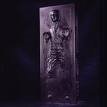skip to main |
skip to sidebar
 I just left some long-winded comments at my 'Secret Ballots' post. Rather than afflict our main page, I just provide you with its introduction:
I just left some long-winded comments at my 'Secret Ballots' post. Rather than afflict our main page, I just provide you with its introduction:
My questioning the practice of secret ballots has had me thinking about how Christians interact with each other or fail to interact with each other due to our frailty and sin. Secret ballots seem like a small, petty issue, but I am really considering what it means for a congregation to walk in the Light together. I am now even noticing what I am calling 'biblical openness' in Martin Chemnitz!
I am very glad that the comments to this post have clarified things, not only to this blog's readers but also in my own mind. Yes, I can now see the need for exceptions: Because of the hardness of the hearts of those whom Solar calls 'political' and also for the sake of the innocent who might suffer at their hands, we should sometimes permit secret ballots on a conditional basis; but from the beginning it has not been this way, to paraphrase Matthew 19:8.
I continue to think that in so many of our relations with one another, we are hiding behind unbiblical fig leaves, and though due to our frailty they are sometimes necessary, we need to acknowledge that from the beginning it has not been this way...
Read the rest here.
I welcome your comments.

"The mask you wear before men will do you no good before Him. He wants to see you as you are, He wants to be gracious to you... He wants to love you."
Does your congregation or church body allow secret ballots in its meetings, assemblies, or conventions?
Do you think that this practice is biblical?
It deeply concerns me when brothers and sisters in Christ demand secret ballots, for I have never heard of a single good reason for the practice, and frankly, they seem completely counter to biblical Christianity and dangerous to the health of a congregation.
Let me explain.
The whole democratization of American Christianity puzzles me. Lutheran churches have adopted practices like voters' assemblies and congregational meetings, and the way such meetings are sometimes run, with secret ballots, seems to be clear evidence of, and I hate to use this term, a dysfunctional church.
 The fact that Christians are sometimes unwilling to publicly say what they think and submit it to God's Word for brotherly discussion, evaluation, and if necessary, correction, -- this is counter to the Christian faith and fellowship and is a very dangerous practice in the life of a congregation.
The fact that Christians are sometimes unwilling to publicly say what they think and submit it to God's Word for brotherly discussion, evaluation, and if necessary, correction, -- this is counter to the Christian faith and fellowship and is a very dangerous practice in the life of a congregation.
Here are some initial reasons for this assertion:1. Perhaps those who want secret ballots are afraid of being mistreated or ridiculed for having certain opinions. In this case, those with differing views might need to change or even repent. Even if we are right, we are called to correct our brothers and sisters "in a spirit of gentleness; each one looking to yourself, so that you too will not be tempted. Bear one another's burdens, and thereby fulfill the law of Christ." (Galatians 6:1-5, NASB)
Secrecy can foster an 'Us vs. Them' mentality among brothers and sisters in Christ and allow both fear and suspicion to undermine genuine fellowship. Secret ballots allow Christians to continue in fear and suspicion of each other.
 2. Perhaps Christians want secret ballots because they cannot explain their opinions in the light of God's Word and are therefore, at best, basing their votes upon subjective feelings. Or graver still, maybe they know that what they are voting for is not in accord with God's Word. Such situations are, of course, not good for the congregation or the voters themselves, for such voters who wish to affect the life of a congregation behind the curtain of secrecy are merely being "tossed about by every wind of doctrine" and their unbiblical voices are affecting the life of the congregation without the possibility of correction that openness provides. This is very dangerous situation, for decisions about Christ's Church are made out of emotion or sin, rather than out faith in God and His Word. (Ephesians 4:14-16, NASB)
2. Perhaps Christians want secret ballots because they cannot explain their opinions in the light of God's Word and are therefore, at best, basing their votes upon subjective feelings. Or graver still, maybe they know that what they are voting for is not in accord with God's Word. Such situations are, of course, not good for the congregation or the voters themselves, for such voters who wish to affect the life of a congregation behind the curtain of secrecy are merely being "tossed about by every wind of doctrine" and their unbiblical voices are affecting the life of the congregation without the possibility of correction that openness provides. This is very dangerous situation, for decisions about Christ's Church are made out of emotion or sin, rather than out faith in God and His Word. (Ephesians 4:14-16, NASB)
3. Perhaps those who want their votes to be secret just don't like the pastor because he faithfully preaches and teaches God's Word in undiluted Law and Gospel. If this is the case, then I would even say that such opposition to the Office of Holy Ministry is demonic in nature and needs to be brought to the Light and then seriously and tenaciously opposed by God's people. Such voters need to be brought to repentance, and the use of secret ballots in this case is endangering their souls.
4. Perhaps there is some hidden, unbiblical agenda, coordinated in political conventicles. It is no secret that people bring the political ways of this world into Christ's Church, and this is also a dangerous situation that must be rooted out by God's people, for Jesus said, "I am the Light of the world; he who follows Me will not walk in the darkness, but will have the Light of life!" (John 8:12, NASB)
 Every public matter in the life of a church should be brought forth and dealt with openly under the Light of God's Word. Satan is, as Samwise Gamgee called Gollum in The Lord of the Rings, a slinker, and as we learned from Screwtape, the Father of Lies thrives upon secrecy. Therefore, it is of utmost importance that members of a congregation stand together under Holy Scripture and its faithful exposition in the Office of Holy Ministry. We must expose the slinker for what he is, even as he attempts to work his mischief through secrecy in the midst of a congregation.
Every public matter in the life of a church should be brought forth and dealt with openly under the Light of God's Word. Satan is, as Samwise Gamgee called Gollum in The Lord of the Rings, a slinker, and as we learned from Screwtape, the Father of Lies thrives upon secrecy. Therefore, it is of utmost importance that members of a congregation stand together under Holy Scripture and its faithful exposition in the Office of Holy Ministry. We must expose the slinker for what he is, even as he attempts to work his mischief through secrecy in the midst of a congregation.
The Father of Lies wants to hold God's people in the bondage of false belief. We know that this is certainly true, so out of Christian love and concern for those who wish secret ballots, we must reject such secrecy and ask for a biblical openness. But Christians should not seek such openness for political purposes, but rather, out of a desire for true Christian fellowship. The Gospel of Christ calls believers to openness and honesty in our relationships with God and with each other, so that we might enjoy peace and true fellowship of the Spirit through God's Word.
Christians are called to walk in the light, and because of the grace of God in Jesus Christ, we can, indeed, take off our masks and bring everything out into the light where it can be approved, corrected, healed, or forgiven.
 In his Small Catechism, Martin Luther explains that in the sixth petition of the Lord's Prayer, we are instructed to pray "that God would guard and keep us, so that the devil, the world, and our flesh may not deceive us, nor seduce us into misbelief, despair, and other great shame and vice." Misbelief or false belief is, indeed, a grave sin to which we are constantly tempted; and it is a sin of which we must repent. Tragically, however, secret ballots help us keep this sin hidden, where correction cannot take place through biblical catehesis or where the healing power of Christ's blood cannot be applied through Holy Absolution. And as Dietrich Bonhoeffer so astutely observed in Life Together, "He who is alone with his sin is utterly alone." Therefore, Christian charity for our brothers and sisters demands that we reject the continued practice of secrecy.
In his Small Catechism, Martin Luther explains that in the sixth petition of the Lord's Prayer, we are instructed to pray "that God would guard and keep us, so that the devil, the world, and our flesh may not deceive us, nor seduce us into misbelief, despair, and other great shame and vice." Misbelief or false belief is, indeed, a grave sin to which we are constantly tempted; and it is a sin of which we must repent. Tragically, however, secret ballots help us keep this sin hidden, where correction cannot take place through biblical catehesis or where the healing power of Christ's blood cannot be applied through Holy Absolution. And as Dietrich Bonhoeffer so astutely observed in Life Together, "He who is alone with his sin is utterly alone." Therefore, Christian charity for our brothers and sisters demands that we reject the continued practice of secrecy.
 Indeed, secret ballots seem to fly in the face of both the nature of Christ (especially in the Gospel of John with its emphasis on light and darkness) and the biblical doctrine of Christian fellowship, through which we are called to 'walk in the Light'. Secret ballots can be used as masks that enable us to avoid the Light of our Lord, so that we do not have to explain our decisions, enter into fruitful dialogue with our brothers and sisters in Christ, or submit ourselves to the Light of God's Word and the Office of Holy Ministry. Secret ballots are one disturbing symptom of sickness in the life of a congregation, one tactic of the enemy's gorilla warfare of darkness against the Light of God's Word.
Indeed, secret ballots seem to fly in the face of both the nature of Christ (especially in the Gospel of John with its emphasis on light and darkness) and the biblical doctrine of Christian fellowship, through which we are called to 'walk in the Light'. Secret ballots can be used as masks that enable us to avoid the Light of our Lord, so that we do not have to explain our decisions, enter into fruitful dialogue with our brothers and sisters in Christ, or submit ourselves to the Light of God's Word and the Office of Holy Ministry. Secret ballots are one disturbing symptom of sickness in the life of a congregation, one tactic of the enemy's gorilla warfare of darkness against the Light of God's Word.
Today the 63rd Convention of my church body, the Lutheran Church-Missouri Synod, commences at the George R. Brown Convention Center in Houston, Texas. The word synod means 'walking together', but how can we join arms in our journey together if we hide them behind our backs in fear and suspicion? Or how can we possibly obey God's command:
Therefore I, the prisoner of the Lord, implore you to walk in a manner worthy of the calling with which you have been called, with all humility and gentleness, with patience, showing tolerance for one another in love, being diligent to preserve the unity of the Spirit in the bond of peace. (Ephesians 4:1-3, NASB)
How is Christian fellowship in the 'unity of the Spirit' under God's Word even possible when we have moved from an open, biblical "Here we stand" approach to witness and fellowship, to a political, individualist "Here I... it's none of your business!"
In conclusion, I would suggest that the continued worldly secrecy in relations between brothers and sisters in Christ is clear evidence that our churches have imbibed political ways of relating to each other that are based upon ungodly concepts of power and individualism, rather than upon a biblical understanding of Christian fellowship that teaches us to bear one another's burdens and speak the truth of God's Word to each other in love.
This widespread infection of political and individualist thinking needs to be marked and rejected by pastors, boards of elders, and church councils for the sake of Christ and His Church. We must not be "conformed to this world, but be transformed by the renewing of our minds, so that we would may prove what the will of God is, that which is good and acceptable and perfect." (Romans 12:2).
Pax Christi.
 I just left some long-winded comments at my 'Secret Ballots' post. Rather than afflict our main page, I just provide you with its introduction:
I just left some long-winded comments at my 'Secret Ballots' post. Rather than afflict our main page, I just provide you with its introduction:














